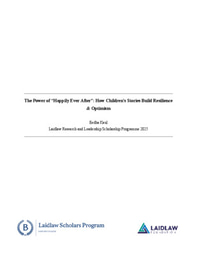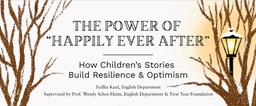Why do happy endings matter?
Research question: What is the role of 'happy endings' in children's literature? Specifically, can they inspire optimism and resilience in children?
I am fascinated by the role of ‘happy endings’ in children’s literature, specifically their potential to inspire optimism and resilience in young minds. I plan to conduct a qualitative analysis of a seminal children’s novel: C.S. Lewis’ The Lion, The Witch, and The Wardrobe (1950). Written in the aftermath of World War II and shaped by Lewis’ service in World War I, the novel reflects a yearning for hope, restoration, and the triumph of good over evil. During the war, thousands of children were displaced from their families and evacuated to unfamiliar environments. Inspired by these experiences, the story follows the Pevensie siblings, after they were relocated to the countryside, into Narnia, a mysterious realm concealed within a wardrobe.
The uplifting finale presents an alternate reality, demonstrating how life could have unfolded with different choices, thus offering its readers psychological respite. To explore the novel’s continued influence on children, my analysis will focus on the thematic aspects of its ending, character resolutions, and narrative arc. Consequently, I will understand if and how the environment it was inspired by impacts the story’s effect on children.
Understanding how happy endings affect children can open new ways of thinking about education, parenting, and leadership. This research could provide ideas to boost resilience and optimism in young readers by demonstrating how reading, specifically happy endings, influences their well-being. Ultimately, I aim to uncover whether the hope offered by children’s literature can serve as a foundation for a more proactive and compassionate generation.


Please sign in
If you are a registered user on Laidlaw Scholars Network, please sign in
Eedha, I really love the angle you’re taking with this research. I’m Asha. I started an ethical fashion brand called Swara when I was 22. Storytelling has always been at the heart of what we do, and it’s the reason I began Swara, to share the stories of women artisans and show what’s possible when their voices are heard.
I also run a Leadership in Action programme now called CraftHER, for Laidlaw Scholars.
Through CraftHER, I’ve seen how stories can plant hope, change how people see the world, and inspire action, a lot like the “happy endings” you’re looking at in children’s books.
I like that you’re exploring them not as an escape, but as a way to build resilience, optimism, and belief in better futures. Excited to see what you find.
Hey Asha, thank you so much! I checked out your brand online, and it looks incredible. It's always exciting to hear that there are more applications than you initially anticipated for your research, and I was so happy to learn about how you're noticing those metaphorical 'happy endings' in your own work!